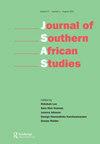Borderlessness and the 20th-Century Rise of the Ndau People’s Subaltern Economy in the Zimbabwe–Mozambique Borderland
IF 0.7
4区 社会学
Q2 AREA STUDIES
引用次数: 0
Abstract
The Ndau society in the Zimbabwe–Mozambique borderland has seemingly been neglected by colonial and post-independence governments. Exclusion from the mainstream economies of the region by the Zimbabwean and Mozambican governments has forced the Ndau to rely largely upon themselves to survive in the remote, poverty-stricken borderland. This survival practice means that many borderland residents embrace an economy of illegality in which trade in drugs, used clothes, game meat and fuel has become a coping mechanism against hardships in the borderland. Among other reactions, the Ndau people take advantage of the remoteness of the borderland to criss-cross the border to seek opportunities and resources to sustain themselves. Relentless cross-border transgressions have thus contributed to a virtual state of ‘borderlessness’ in the region, and this is manipulated by the Ndau to participate in a variety of informal cross-border survival pursuits. The discussion that follows provides a critical review of the lives and economic practices of the marginalised Ndau communities within an illegal borderland economy. It is the authors’ contention that the borderland illegal economy has sustained the Ndau community’s existence.无边界与20世纪津巴布韦-莫桑比克边境地区恩道人民下层经济的崛起
津巴布韦和莫桑比克边境地区的恩道族社会似乎被殖民和独立后的政府所忽视。由于被津巴布韦和莫桑比克政府排除在该地区的主流经济之外,恩道族被迫在偏远、贫困的边境地区主要依靠自己生存。这种生存实践意味着许多边境居民信奉非法经济,毒品、旧衣服、野味和燃料贸易已成为应对边境困难的一种机制。在其他反应中,恩道人利用边境偏远的优势,纵横穿越边境,寻求机会和资源来维持自己。因此,无情的跨境越界行为导致了该地区实际上的“无边界”状态,这被Ndau操纵,参与各种非正式的跨境生存追求。接下来的讨论对非法边境经济中被边缘化的恩道社区的生活和经济实践进行了批判性的回顾。作者的论点是,边境非法经济维持了恩道社区的存在。
本文章由计算机程序翻译,如有差异,请以英文原文为准。
求助全文
约1分钟内获得全文
求助全文
来源期刊

Journal of Southern African Studies
AREA STUDIES-
CiteScore
1.40
自引率
0.00%
发文量
73
期刊介绍:
The Journal of Southern African Studies is an international publication for work of high academic quality on issues of interest and concern in the region of Southern Africa. It aims at generating fresh scholarly enquiry and rigorous exposition in the many different disciplines of the social sciences and humanities, and periodically organises and supports conferences to this end, sometimes in the region. It seeks to encourage inter-disciplinary analysis, strong comparative perspectives and research that reflects new theoretical or methodological approaches. An active advisory board and an editor based in the region demonstrate our close ties with scholars there and our commitment to promoting research in the region.
 求助内容:
求助内容: 应助结果提醒方式:
应助结果提醒方式:


